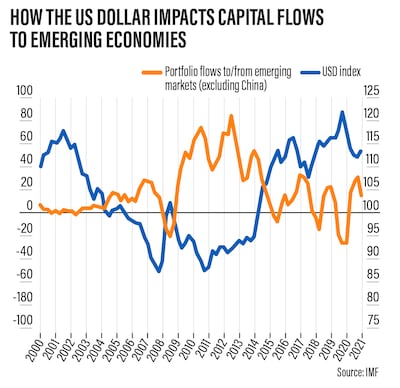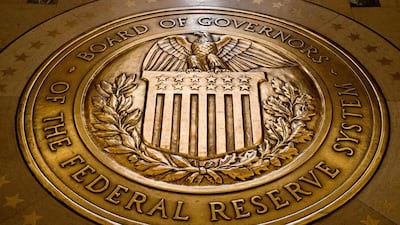The resurgent pandemic and faster US Federal Reserve tightening pose risks to global recovery and emerging economies should prepare for bouts of economic turbulence, according to the International Monetary Fund.
As well as the rampant Omicron variant, supply-side pressures and the Fed’s decision to accelerate the tapering of asset purchases, emerging markets are confronting elevated inflation and substantially higher public debt, the Washington-based lender said in a blog post on Monday.
“Average gross government debt in emerging markets is up by almost 10 percentage points since 2019 reaching an estimated 64 per cent of gross domestic product by the end of 2021, with large variations across countries,” said Stephan Danninger, who co-wrote the blog and is division chief of macro policies in the IMF’s strategy, policy and review department.
“But in contrast to the US, their economic recovery and labour markets are less robust. While dollar borrowing costs remain low for many, concerns about domestic inflation and stable foreign funding led several emerging markets last year, including Brazil, Russia and South Africa, to start raising interest rates,” he said.
The global economy, which in 2020 entered its deepest recession since the 1930s, bounced back strongly last year on the back of $25 trillion in fiscal and monetary support by governments and central banks around the world.
In October, the IMF lowered its global economic growth forecast on weakening momentum, Covid-19 outbreaks, uneven access to vaccines, supply chain disruptions and risks from rising inflation. The fund revised growth down in 2021 to 5.9 per cent from its 6 per cent estimate in July, while keeping its 2022 projection at 4.9 per cent.
The unabated spread of the coronavirus since November and subsequent reintroduction of strict pandemic-related measures in large parts of Europe, Asia and the Americas have raised more questions on economic momentum this year.
Persisting supply disruption in advanced economies and the worsening dynamic of Omicron, which threatens to overwhelm healthcare systems in low-income and developing countries, are adding to the economic weakness, the lender said.
division chief, IMF’s macro policies unit
History shows that the effects for emerging markets are likely to be benign if Fed tightening is “gradual, well telegraphed and in response to a strengthening recovery”. Emerging market currencies may still depreciate, but foreign demand would offset the impact from rising financing costs, the IMF said on Monday.
But a scenario of faster Fed rate increases in response to broad-based US wage inflation or sustained supply bottlenecks could rattle financial markets and tighten financial conditions globally. This could come with a slowing of US demand and trade and may lead to capital outflows and currency depreciation in emerging markets, the IMF said.
“The impact of Fed tightening in a scenario like that could be more severe for vulnerable countries,” said Kenneth Kang, a deputy director in the fund’s surveillance, policy and review department, who is one of the blog’s co-authors.
“In recent months, emerging markets with high public and private debt, foreign exchange exposures and lower current-account balances saw already larger movements of their currencies relative to the US dollar. The combination of slower growth and elevated vulnerabilities could create adverse feedback loops for such economies.”
The IMF blog suggested that emerging markets should tailor their response to tighter funding conditions based on their circumstances and vulnerabilities.

Those with policy credibility on containing inflation can tighten monetary policy more gradually, while others with stronger inflation pressures or weaker institutions must act swiftly and comprehensively, the IMF said.
“In either case, responses should include letting currencies depreciate and raising benchmark interest rates,” Hélène Poirson, deputy division chief in the IMF’s macro policy unit and the blog’s co-author, said.
“If faced with disorderly conditions in foreign exchange markets, central banks with sufficient reserves can intervene provided this intervention does not substitute for warranted macroeconomic adjustment.”
Emerging markets must take steps now to strengthen policy frameworks and reduce vulnerabilities.
Measures should include clear and consistent communication of policy plans by central banks to enhance the public’s understanding of the need to pursue price stability. Countries with high levels of foreign currency-denominated debt must look to hedge their exposures and the maturity of obligations should be extended to reduce rollover risks, the IMF said.
deputy director, IMF’s surveillance, policy and review department
Solutions should also be readied for countries where corporate debt and bad loans were high even before the pandemic, it said.
“Setting a credible commitment to a medium-term fiscal strategy would help boost investor confidence and regain room for fiscal support in a downturn. Such a strategy could include announcing a comprehensive plan to gradually increase tax revenues, improve spending efficiency or implement structural fiscal reforms such as pension and subsidy overhauls,” the lender said in the blog.
“Despite the expected economic recovery, some countries may need to rely on the global financial safety net. That may include using swap lines, regional financing arrangements and multilateral resources.”


